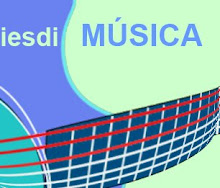Esta noche llegan a Fuenlabrada nuestros compañeros holandeses. Durante diez días van a estar entre nosotros conociendo España y nuestra cultura. La agenda es, como todos los años, de lo más completo: visita a Toledo, El Escorial y Segovia y sus principales museos y monumentos, visita en Madrid al Museo del Prado, el Thyssen, Palacio Real, el Reina Sofía, etc.
Mañana mismo, para no perder ni un minuto, nuestro Departamento de Música organiza un concierto de guitarra clásica para dar a conocer a nuestro grupo de invitados la música que en el siglo XIX se hacía en España y que tanto interesó y sigue interesando a músicos y aficionados de todas partes del mundo.
It wouldn't be hard to argue that the guitar as a musical instrument has a unique prominent cultural roll worldwide. We only need to reflect on this matter for a while to realize to what extent the guitar is connected to the human being and its communities, no matter how different their cultural backgrounds may be. If we were to list all the possible contexts in which the guitar takes this importance, we would be amazed. We find guitars in a huge amount of music styles and traditions: pop-rock and all its possible variants, jazz, flamenco, bluegrass, song writing, fado, bossa nova, mariachi music, salsa and Cuban son, tango, and probably any traditional Latin American style we may think of. Classical music has helped develop the guitar technique and repertoire and its recognition globally. We can see the importance of the guitar probably in every classical music genre from solo to vocal, chamber, or symphonic music. We may say that the presence of the guitar nowadays is a universal, cross cultural phenomenon, and has been like this for centuries.
Among the wide array of forms we can associate to the guitar, the one that we still call "the Spanish Guitar" will be the focus of our program, if only because all the rest are either similar or have an important number of similar features.
Among the wide array of forms we can associate to the guitar, the one that we still call "the Spanish Guitar" will be the focus of our program, if only because all the rest are either similar or have an important number of similar features.
For over five centuries, the Spanish Guitar has been a beloved instrument all around the world. Its development in History has been always connected to both traditional popular music and written academic music. Its repertoire shows this double-hearted essence almost in every moment and place throughout the years. The 19th century, with its aesthetic mixture of Classical, Romantic and Nationalistic trends in music, was the time when our modern classical guitar was settled. Still today anyone who learns to play the guitar goes back to these years for repertoire and still unsurpassed learning methods.
In this concert we will listen to a
selection of music written by 19th Century Spanish composers. Some of the most
recognizable features of the Spanish guitar and the Spanish music are
represented and brought to us through this program.
Jesús Saiz Huedo























































